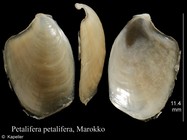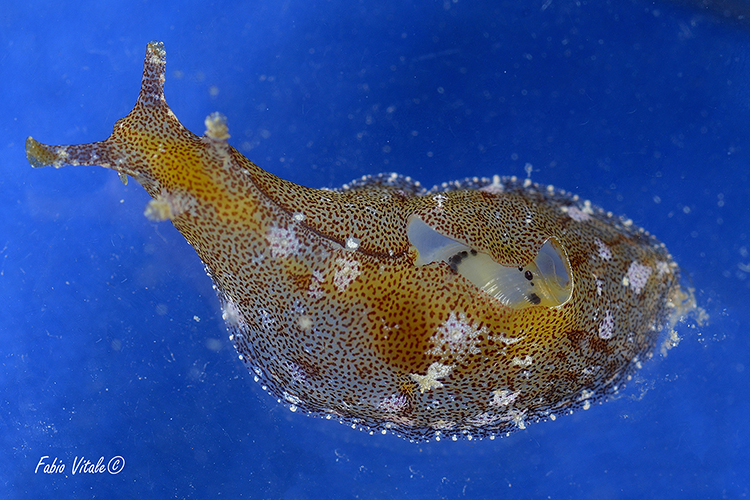WoRMS taxon details
Petalifera petalifera (Rang, 1828)
139597 (urn:lsid:marinespecies.org:taxname:139597)
accepted
Species
Aplysia brugnatelli van Beneden & Robb, 1835 · unaccepted (synonym)
Aplysia depressa Cantraine, 1835 · unaccepted (original combination)
Aplysia petalifera Rang, 1828 · unaccepted (original combination)
Aplysia unguifera Rang, 1828 · unaccepted (synonym)
Aplysia webbii van Beneden & Robb, 1835 · unaccepted (synonym)
Aplysiella webbi (van Beneden & Robb, 1835) · unaccepted
Phyllaplysia depressa (Cantraine, 1835) · unaccepted
marine
(of Aplysia petalifera Rang, 1828) Rang, S. (1828). <i>Histoire naturelle des Aplysiens</i>. Paris: Firmin Didot. 83 pp. 24 pls. , available online at https://www.biodiversitylibrary.org/page/14983674
page(s): 52; pl. 5 fig. 1-3 [details]
page(s): 52; pl. 5 fig. 1-3 [details]
Taxonomy The identity of the small sea hares of the genera Phyllaplysia and Petalifera is very confused. The situation is also...
Taxonomy The identity of the small sea hares of the genera Phyllaplysia and Petalifera is very confused. The situation is also confused by many authors considering that species of Phyllaplysia lacked a shell while those of Petalifera possessed one.
The original description of Petalifera petalifera is not easy to interpret, but most authors have accepted it to apply to a reasonably common, small translucent sea hare covered in an irregular pattern of brown to green patches and diffuse spots. It has been reviewed and illustrated by Fasulo et al. (1984) and Terreni (1997).
Phyllaplysia lafonti was originally described from Baie d'Arcachon on the Atlantic coast of France. Like all species of Phyllaplysia and Petalifera it is described as small, flattened, and with very reduced parapodia. The colour is described as very variable, but one distinctive feature of the written desription and the accompanying drawing are the way the body consists of concentric bands ['zones concentriques'] of lighter and darker pigmentation. Also described are whitish spots ringed with purple. Fischer was unable to determine whether there was a shell but Terreni (1997) illustrates a relatively large fragile internal shell. It is hard to be sure which of the earlier references to this species in the Mediterranean are actually correct, but there are some good colour photos of correctly identified Phyllaplysia lafonti in an article by Terreni (1997) in La Conchiglia. In this article he compares it with Petalifera petalifera. [details]
The original description of Petalifera petalifera is not easy to interpret, but most authors have accepted it to apply to a reasonably common, small translucent sea hare covered in an irregular pattern of brown to green patches and diffuse spots. It has been reviewed and illustrated by Fasulo et al. (1984) and Terreni (1997).
Phyllaplysia lafonti was originally described from Baie d'Arcachon on the Atlantic coast of France. Like all species of Phyllaplysia and Petalifera it is described as small, flattened, and with very reduced parapodia. The colour is described as very variable, but one distinctive feature of the written desription and the accompanying drawing are the way the body consists of concentric bands ['zones concentriques'] of lighter and darker pigmentation. Also described are whitish spots ringed with purple. Fischer was unable to determine whether there was a shell but Terreni (1997) illustrates a relatively large fragile internal shell. It is hard to be sure which of the earlier references to this species in the Mediterranean are actually correct, but there are some good colour photos of correctly identified Phyllaplysia lafonti in an article by Terreni (1997) in La Conchiglia. In this article he compares it with Petalifera petalifera. [details]
MolluscaBase eds. (2024). MolluscaBase. Petalifera petalifera (Rang, 1828). Accessed through: World Register of Marine Species at: https://www.marinespecies.org/aphia.php?p=taxdetails&id=139597 on 2024-11-21
Date
action
by
![]() The webpage text is licensed under a Creative Commons Attribution 4.0 License
The webpage text is licensed under a Creative Commons Attribution 4.0 License
original description
(of Aplysia depressa Cantraine, 1835) Cantraine, F. J. (1835). Diagnoses ou descriptions succinctes de quelques espèces nouvelles de mollusques. <em>Bulletins de l'Académie Royale des Sciences et Belles-Lettres de Bruxelles.</em> 2(11): 380-401., available online at https://www.biodiversitylibrary.org/page/2880681 [details] 
original description (of Aplysia petalifera Rang, 1828) Rang, S. (1828). <i>Histoire naturelle des Aplysiens</i>. Paris: Firmin Didot. 83 pp. 24 pls. , available online at https://www.biodiversitylibrary.org/page/14983674
page(s): 52; pl. 5 fig. 1-3 [details]
original description (of Aplysia brugnatelli van Beneden & Robb, 1835) van Beneden P. (1835). Résultats d'un voyage fait sur le bord de la Méditerranée. <i>Comptes rendus hebdomadaires des séances de l'Académie des Sciences</i>, 1: 230, available online at http://gallica.bnf.fr/ark:/12148/bpt6k29606/f231.table [details]
original description (of Aplysia unguifera Rang, 1828) Rang, S. (1828). <i>Histoire naturelle des Aplysiens</i>. Paris: Firmin Didot. 83 pp. 24 pls. , available online at https://www.biodiversitylibrary.org/page/14983674 [details]
original description (of Aplysia webbii van Beneden & Robb, 1835) van Beneden P. (1835). Résultats d'un voyage fait sur le bord de la Méditerranée. <i>Comptes rendus hebdomadaires des séances de l'Académie des Sciences</i>, 1: 230, available online at http://gallica.bnf.fr/ark:/12148/bpt6k29606/f231.table
page(s): 230 [details]
basis of record Gofas, S.; Le Renard, J.; Bouchet, P. (2001). Mollusca. in: Costello, M.J. et al. (eds), European Register of Marine Species: a check-list of the marine species in Europe and a bibliography of guides to their identification. <em>Patrimoines Naturels.</em> 50: 180-213., available online at http://www.vliz.be/imisdocs/publications/ocrd/254404.pdf [details]
additional source Fasulo, G.; Izzillo, F.; Russo, G. F.; Toscano, F.; Villani, G. (1985). Nota su <i>Petalifera petalifera</i> (Rang, 1828) (Gastropoda, Opisthobranchia, Aplysiomorpha) specie mediterranea poco conosciuta. Considerazioni sistematiche, ecologiche e biogeografiche. <em>Bollettino Malacologico.</em> 20 (9-12): 263-272., available online at http://biodiversitylibrary.org/page/49923789 [details]
additional source Terreni, G. (1997). Rinvenimento di un esemplare di <i>Phyllaplysia lafonti</i> (P. Fischer, 1870) nelle acque litorali di Livorno (Gastropoda, Opisthobranchia, Aplysiomorpha). <em>La Conchiglia, Roma.</em> 29 (282): 45-47. [details] Available for editors [request]
[request]
original description (of Aplysia petalifera Rang, 1828) Rang, S. (1828). <i>Histoire naturelle des Aplysiens</i>. Paris: Firmin Didot. 83 pp. 24 pls. , available online at https://www.biodiversitylibrary.org/page/14983674
page(s): 52; pl. 5 fig. 1-3 [details]
original description (of Aplysia brugnatelli van Beneden & Robb, 1835) van Beneden P. (1835). Résultats d'un voyage fait sur le bord de la Méditerranée. <i>Comptes rendus hebdomadaires des séances de l'Académie des Sciences</i>, 1: 230, available online at http://gallica.bnf.fr/ark:/12148/bpt6k29606/f231.table [details]
original description (of Aplysia unguifera Rang, 1828) Rang, S. (1828). <i>Histoire naturelle des Aplysiens</i>. Paris: Firmin Didot. 83 pp. 24 pls. , available online at https://www.biodiversitylibrary.org/page/14983674 [details]
original description (of Aplysia webbii van Beneden & Robb, 1835) van Beneden P. (1835). Résultats d'un voyage fait sur le bord de la Méditerranée. <i>Comptes rendus hebdomadaires des séances de l'Académie des Sciences</i>, 1: 230, available online at http://gallica.bnf.fr/ark:/12148/bpt6k29606/f231.table
page(s): 230 [details]
basis of record Gofas, S.; Le Renard, J.; Bouchet, P. (2001). Mollusca. in: Costello, M.J. et al. (eds), European Register of Marine Species: a check-list of the marine species in Europe and a bibliography of guides to their identification. <em>Patrimoines Naturels.</em> 50: 180-213., available online at http://www.vliz.be/imisdocs/publications/ocrd/254404.pdf [details]
additional source Fasulo, G.; Izzillo, F.; Russo, G. F.; Toscano, F.; Villani, G. (1985). Nota su <i>Petalifera petalifera</i> (Rang, 1828) (Gastropoda, Opisthobranchia, Aplysiomorpha) specie mediterranea poco conosciuta. Considerazioni sistematiche, ecologiche e biogeografiche. <em>Bollettino Malacologico.</em> 20 (9-12): 263-272., available online at http://biodiversitylibrary.org/page/49923789 [details]
additional source Terreni, G. (1997). Rinvenimento di un esemplare di <i>Phyllaplysia lafonti</i> (P. Fischer, 1870) nelle acque litorali di Livorno (Gastropoda, Opisthobranchia, Aplysiomorpha). <em>La Conchiglia, Roma.</em> 29 (282): 45-47. [details] Available for editors
 Present
Present  Present in aphia/obis/gbif/idigbio
Present in aphia/obis/gbif/idigbio  Inaccurate
Inaccurate  Introduced: alien
Introduced: alien  Containing type locality
Containing type locality
From editor or global species database
Taxonomy The identity of the small sea hares of the genera Phyllaplysia and Petalifera is very confused. The situation is also confused by many authors considering that species of Phyllaplysia lacked a shell while those of Petalifera possessed one. The original description of Petalifera petalifera is not easy to interpret, but most authors have accepted it to apply to a reasonably common, small translucent sea hare covered in an irregular pattern of brown to green patches and diffuse spots. It has been reviewed and illustrated by Fasulo et al. (1984) and Terreni (1997).
Phyllaplysia lafonti was originally described from Baie d'Arcachon on the Atlantic coast of France. Like all species of Phyllaplysia and Petalifera it is described as small, flattened, and with very reduced parapodia. The colour is described as very variable, but one distinctive feature of the written desription and the accompanying drawing are the way the body consists of concentric bands ['zones concentriques'] of lighter and darker pigmentation. Also described are whitish spots ringed with purple. Fischer was unable to determine whether there was a shell but Terreni (1997) illustrates a relatively large fragile internal shell. It is hard to be sure which of the earlier references to this species in the Mediterranean are actually correct, but there are some good colour photos of correctly identified Phyllaplysia lafonti in an article by Terreni (1997) in La Conchiglia. In this article he compares it with Petalifera petalifera. [details]
To Biodiversity Heritage Library (11 publications)
To Biodiversity Heritage Library (14 publications) (from synonym Aplysia petalifera Rang, 1828)
To Biodiversity Heritage Library (16 publications) (from synonym Phyllaplysia depressa (Cantraine, 1835))
To European Nucleotide Archive, ENA (Petalifera petalifera)
To GenBank (3 nucleotides; 1 proteins)
To GenBank (3 nucleotides; 1 proteins) (from synonym Aplysia petalifera Rang, 1828)
To Malacopics (Petalifera petalifera (Rang, 1828) Italy, Sicilia, Palermo)
To Marine Heterobranchia (Salento Sommerso)
To PESI
To PESI (from synonym Aplysia brugnatelli van Beneden & Robb, 1835)
To PESI (from synonym Aplysia unguifera Rang, 1828)
To PESI (from synonym Aplysia webbii van Beneden & Robb, 1835)
To PESI (from synonym Phyllaplysia depressa (Cantraine, 1835))
To PESI (from synonym Aplysia depressa Cantraine, 1835)
To PESI (from synonym Aplysia petalifera Rang, 1828)
To Sea Slug Forum (via archive.org)
To USNM Invertebrate Zoology Mollusca Collection
To ITIS
To Biodiversity Heritage Library (14 publications) (from synonym Aplysia petalifera Rang, 1828)
To Biodiversity Heritage Library (16 publications) (from synonym Phyllaplysia depressa (Cantraine, 1835))
To European Nucleotide Archive, ENA (Petalifera petalifera)
To GenBank (3 nucleotides; 1 proteins)
To GenBank (3 nucleotides; 1 proteins) (from synonym Aplysia petalifera Rang, 1828)
To Malacopics (Petalifera petalifera (Rang, 1828) Italy, Sicilia, Palermo)
To Marine Heterobranchia (Salento Sommerso)
To PESI
To PESI (from synonym Aplysia brugnatelli van Beneden & Robb, 1835)
To PESI (from synonym Aplysia unguifera Rang, 1828)
To PESI (from synonym Aplysia webbii van Beneden & Robb, 1835)
To PESI (from synonym Phyllaplysia depressa (Cantraine, 1835))
To PESI (from synonym Aplysia depressa Cantraine, 1835)
To PESI (from synonym Aplysia petalifera Rang, 1828)
To Sea Slug Forum (via archive.org)
To USNM Invertebrate Zoology Mollusca Collection
To ITIS



